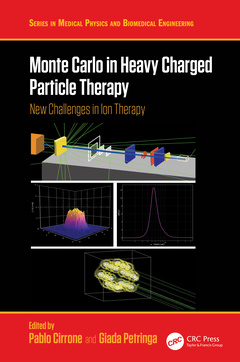Description
Monte Carlo in Heavy Charged Particle Therapy
New Challenges in Ion Therapy
Series in Medical Physics and Biomedical Engineering Series
Coordinators: Cirrone Pablo, Petringa Giada
Language: English
Subjects for Monte Carlo in Heavy Charged Particle Therapy:
· 17.8x25.4 cm · Hardback
Description
/li>Contents
/li>Readership
/li>Biography
/li>
This book explores the current difficulties and unsolved problems in the field of particle therapy and, after analysing them, discusses how (and if) innovative Monte Carlo approaches can be used to solve them.
Each book chapter is dedicated to a different sub-discipline, including multi-ion treatments, flash-radiotherapy, laser-accelerated beams, nanoparticles effects, binary reactions to enhance radiobiology, and space-related issues. This is the first book able to provide a comprehensive insight into this exciting field and the growing use of Monte Carlo in medical physics.
It will be of interest to graduate students in medicine and medical physics, in addition to researchers and clinical staff.
Key Features:
- Explores the exciting and interdisciplinary topic of Monte Carlo in particle therapy and medicine
- Addresses common challenges in the field
- Edited by an authority on the subject, with chapter contributions from specialists
Chapter 1: The Monte Carlo Method and Its Applications to Heavily Charged Particle Therapy. Chapter 2: Applications of Monte Carlo Calculations in Clinical Dosimetry of Proton and Ion Beams. Chapter 3: Solving Range Uncertainties with Gamma Prompt/Charged Particle Prompt. Chapter 4: Macroscopic and microscopic calculation approaches for LET calculations. Chapter 5: Low energy inelastic process in hadrontherapy. Chapter 6: Experimental Data of Nuclear Fragmentation for Validating Monte Carlo Modes: Present Availability and Lacks. Chapter 7: Quality assurance in particle therapy with PET. Chapter 8: Radioactive beams for ion therapy: Monte Carlo simulations and experimental verifications. Chapter 9: Monte Carlo and Microdosimetry in particle radiotherapy. Chapter 10: Monte Carlo to link RBE with radiation quality quantities. Chapter 11: Physical and Biological Impact of Projectile and Target Fragmentation. Chapter 12: Monte Carlo characterisation of nanoparticle radio-enhancement for hadron therapy. Chapter 13: Increasing particle therapy biological effectiveness by nuclear reaction-driven binary strategies. Chapter 14: Monte Carlo simulations for Targeted Alpha Therapy. Chapter 15: Experimental and modelling challenges in FLASH radiotherapy with Monte Carlo Methods. Chapter 16: Towards Multiple Ion Applications in Particle Therapy. Chapter 17: Monte Carlo for chemistry in radiation biology. Chapter 18: Recent developments in the TRAX particle track structure code. Chapter 19: Machine Learning for Monte Carlo Simulations. Chapter 20: Speed-up MC in charged particle applications. Chapter 21: Monte Carlo and Analytical codes for Dose planning and recalculation: limits and differential advantages.
Pablo Cirrone is a medical physicist and researcher at the Laboratori Nazionali del Sud of INFN, Italy, where he supports and coordinates various experimental groups. Dr. Cirrone is an expert in the use of proton and ion in radiation treatment and of absolute and relative dosimetry in electron, photon and ion beam. He is an expert in the development and test of detectors for medical applications, of the production and use of laser-driven beams for medical and multidisciplinary applications and recipient of the Michael Gotein Award. He is active on many scientific committees and organizes national and international conferences.
Giada Petringa is a researcher at the Laboratori Nazionali del Sud of INFN, Italy. Dr. Petringa has a professional experience in the field of Monte Carlo simulations for medical applications, dosimetry, microdosimetry, and diagnostics with conventional and laser-driven proton beams. In 2019 she had a MSCA-IF-2019 (Marie Sklodowska-Curie Actions-Individual Fellowship) grant funded by the European Community in the framework of the H2020 program. She is a member of the Editorial Board of the international journal Physica Medica - European Journal of Medical. She organized more than fifteen international Geant4 Schools. She is an official member of the Geant4 code Collaboration at CERN since 2019. She is a code developer, and she collaborates to maintain two of the official examples of the code.




